9 start with G start with G
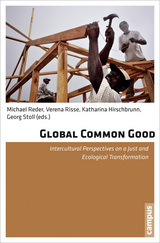
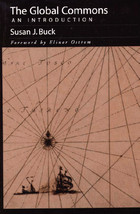
Vast areas of valuable resources unfettered by legal rights have, for centuries, been the central target of human exploitation and appropriation. The global commons -- Antarctica, the high seas and deep seabed minerals, the atmosphere, and space -- have remained exceptions only because access has been difficult or impossible, and the technology for successful extraction has been lacking. Now, technology has caught up with desire, and management regimes are needed to guide human use of these important resource domains.
In The Global Commons, Susan Buck considers the history of human interactions with each of the global commons areas and provides a concise yet thorough account of the evolution of management regimes for each area. She explains historical underpinnings of international law, examines the stakeholders involved, and discusses current policy and problems associated with it.
Buck applies key analytical concepts drawn from institutional analysis and regime theory to examine how legal and political concerns have affected the evolution of management regimes for the global commons. She presents in-depth case studies of each of the four regimes, outlining the historical evolution of the commons -- development of interest in exploiting the resource domain; conflicts among nations over the use of the commons; and efforts to design institutions to control access to the domains and to regulate their use -- and concluding with a description of the management regime that eventually emerged from the informal and formal negotiations.
The Global Commons provides a clear, useful introduction to the subject that will be of interest to general readers as well as to students in international relations and international environmental law, and in environmental law and policy generally.
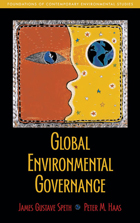
Global Environmental Governance offers the essential information, theory, and practical insight needed to tackle this critical challenge. It examines ten major environmental threats-climate disruption, biodiversity loss, acid rain, ozone depletion, deforestation, desertification, freshwater degradation and shortages, marine fisheries decline, toxic pollutants, and excess nitrogen-and explores how they can be addressed through treaties, governance regimes, and new forms of international cooperation.
Written by Gus Speth, one of the architects of the international environmental movement, and accomplished political scientist Peter M. Haas, Global Environmental Governance tells the story of how the community of nations, nongovernmental organizations, scientists, and multinational corporations have in recent decades created an unprecedented set of laws and institutions intended to help solve large-scale environmental problems. The book critically examines the serious shortcomings of current efforts and the underlying reasons why disturbing trends persist. It presents key concepts in international law and regime formation in simple, accessible language, and describes the current institutional landscape as well as lessons learned and new directions needed in international governance. Global Environmental Governance is a concise guide, with lists of key terms, study questions, and other features designed to help readers think about and understand the concepts discussed.
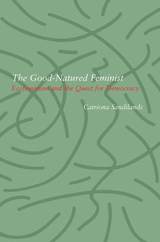
A foundational statement of the democratic promise of ecofeminism.
Heroic mothers defending home and hearth against a nature deformed by multinationalist corporate practice: this may be a compelling story, but it is not necessarily the source of valid feminist or ecological critique. What’s missing is the democratic element, an insistence on bringing to public debate all the relations of gender and nature that such a view takes for granted. This book aims to situate a commitment to theory and politics—that is, to democratic practice—at the center of ecofeminism and, thus, to move toward an ecofeminism that is truly both feminist and ecological.
The Good-Natured Feminist inaugurates a sustained conversation between ecofeminism and recent writings in feminist postmodernism and radical democracy. Starting with the assumption that ecofeminism is a body of democratic theory, the book tells how the movement originated in debates about “nature” in North American radical feminisms, how it then became entangled with identity politics, and how it now seeks to include nature in democratic conversation and, especially, to politicize relations between gender and nature in both theoretical and activist milieus.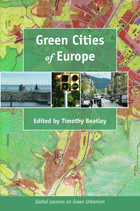
Timothy Beatley has brought together leading experts from Paris, Freiburg, Copenhagen, Helsinki, Heidelberg, Venice, Vitoria-Gasteiz, and London to illustrate groundbreaking practices in sustainable urban planning and design. These cities are developing strong urban cores, building pedestrian and bicycle infrastructure, and improving public transit. They are incorporating ecological design and planning concepts, from solar energy to natural drainage and community gardens. And they are changing the way government works, instituting municipal "green audits" and reforming economic incentives to encourage sustainability.
Whatever their specific tactics, these communities prove that a holistic approach is needed to solve environmental problems and make cities sustainable. Beatley and these esteemed contributors offer vital lessons to the domestic planning community about not only what European cities are doing to achieve that vision, but precisely how they are doing it. The result is an indispensible guide to greening American cities.

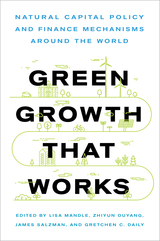
Green Growth That Works is the first practical guide to bring together pragmatic finance and policy tools that can make investment in natural capital both attractive and commonplace. The authors present six mechanisms that demonstrate a range of approaches used around the globe to conserve and restore earth’s myriad ecosystems, including:
- Government subsidies
- Regulatory-driven mitigation
- Voluntary conservation
- Water funds
- Market-based transactions
- Bilateral and multilateral payments
Pioneered by leading scholars from the Natural Capital Project, this valuable compendium of proven techniques can guide agencies and organizations eager to make green growth work anywhere in the world.

Joy Y. Zhang and Michael Barr explain how environmental problems are transforming Chinese society through new developments such as the struggle for clean air, low-carbon conspiracy theories, new forms of public fund raising and the international tactics of grassroots NGOs. In doing so, they challenge static understandings of state-society relations in China.
Green Politics in China is an illuminating and detailed investigation which provides crucial insights into how China is both changing internally and emerging as a powerful player in global environmental politics.
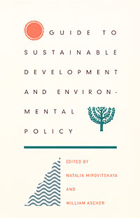
The guide combines formal, objective entries with critical commentaries that emphasize different opinions and controversies. With succinct explanations of more than a thousand terms, thoughtful interpretations by international experts, and helpful cross-referencing, this resource is designed to serve as a roadmap for understanding the issues and debates in the overlapping fields of environment and development. Intended for use by activists, journalists, policymakers, students, scholars, and interested citizens, the Guide to Sustainable Development and Environmental Policy will be a helpful tool for anyone trying to get a comprehensive look at the many environmental organizations, schools of thought, development programs, international environmental treaties, conventions, and strategies that have proliferated in the past few decades.
READERS
Browse our collection.
PUBLISHERS
See BiblioVault's publisher services.
STUDENT SERVICES
Files for college accessibility offices.
UChicago Accessibility Resources
home | accessibility | search | about | contact us
BiblioVault ® 2001 - 2024
The University of Chicago Press









